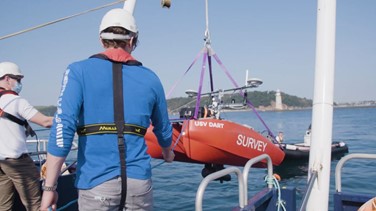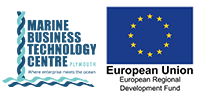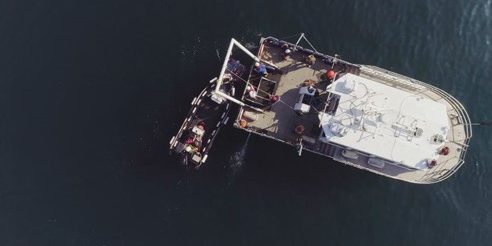Project Overview
HydroSurv is a Devon-based company working to deliver a future where all inland and coastal data acquisition is delivered by low-impact, economic autonomous vessels. Taking a wholeistic approach to this vision, the business designs and builds uncrewed survey vessels (USVs), and pioneers innovative environmental data capture methods, including processing and interpretive reporting techniques.
In the midst of managing a fast-moving design and manufacture operation, as well as a rolling R&D trials programme underpinned by the UK Industrial Strategy Challenge Fund, the business needed to push the envelope with regard to multi-USV coastal survey and sought to collaborative with the MBTC to make this happen.
Opportunities for this new approach to marine survey are growing across the globe. By leveraging MBTC support to work the University of Plymouth, HydroSurv sought to raise market awareness of their offer by performing a complex and innovative sea trial within the Smart Sound Plymouth proving ground; simulteaneously demonstrating the business’s latest USV product and data gathering service.
How did the MBTC support the business?
As a Devon-based SME, HydroSurv is eligible for free access to ‘USV CETUS’, a state of the art C-Worker 4 uncrewed surface vessel, made by L3 Harris and owned by the University of Plymouth. This platform is part-funded by the European Regional Development Fund (ERDF) as part of the University’s participation in the Marine Business Technology Centre (MBTC) project.
Free access to ‘USV CETUS’ includes access to Smart Sound Plymouth via the University’s fleet of research vessels and commercial workboats, with the University’s experienced skippers and technical experts on hand to support complex marine technology trials at sea.
Central to HydroSurv’s aims of democratising ocean data for new users, as well as established hydrographic and environmental survey commissioners, is the company’s range of ‘Rapid Environmental Assessment Vessels’ – electrically-propelled uncrewed craft for waterborne data collection within inland and nearshore environments.
Working with the University’s internationally recognised experts in marine science, a bathymetric survey using two USVs and a mothership vessel was planned to run along a representative areas of coastal and port infrastructure; the outer wall of Plymouth Sound’s Breakwater.
Both USVs were fitted with the same technology – a multibeam echo sounder supplied by leading manufacturer NORBIT – and used a complex sonar array to map a three-dimensional view of the seabed to exceptional high resolution. The data collection was supported by leading software provider QPS.
The survey was successfully completed with visible results by the three vessels in a co-ordinated pattern; requiring less people, less time and less carbon emissions.
Testimonials
“Perhaps the biggest achievement of this project was the amount of data collected in such a short space of time. In total, 60km of survey lines were covered by the three vehicles in just three hours, working out at a productive 20km line distance per hour – a great outcome which highlights the future importance of force-multiplier strategies using unmanned surface vehicles to increase efficiencies and reduce cost. Collaborating with the MBTC team has been a positive experience, and gaining access to assets including the USV CETUS is the best demonstration of the University supporting local marine technology businesses.” – David Hull, Chief Executive of HydroSurv Unmanned Survey (UK) Limited

Benefits
- What where the project results?
- HydroSurv proved that a force multiplier campaign using small-scale USVs is an effective means to deliver coastal survey at reduced time, cost, risk and environmental impact.
- Working with University of Plymouth’s leading Hydrography department and their graduates, the company successfully grew it’s talent pool by appointing a new member of staff.
- What effect did these results have on the business?
- HydroSurv has tangible evidence of their capability to fulfill comercial contracts in coastal survey utilising USV force multiplier campaigns.
- In working with Smart Sound Plymouth via the University of Plymouth, the business was walked through the planning and permission protocols required to undertake professional sea trials that are compliant to the UK Marine Autonomous Systems Codes of Conduct.
- The business has also become plugged into potential global opportunities through joining the marine autonomy community of Smart Sound Plymouth via the MBTC and the Future Autonomous at Sea Techonologies (FAST) Cluster.
Media Links
- Video Case Study: https://www.youtube.com/watch?v=b7qbJJIDBI0
- HydroSurv – https://www.hydro-surv.com/
- USV CETUS – https://www.plymouth.ac.uk/news/vessel-confirms-universitys-place-at-forefront-of-autonomous-ocean-science
- Marine Science at The University of Plymouth – https://www.plymouth.ac.uk/schools/school-of-biological-and-marine-sciences/marine-science-at-plymouth
- Smart Sound Plymouth – https://smartsoundplymouth.co.uk/Home
- Norbit Subsea – https://norbit.com/subsea/
- QPS – https://qps.nl/
- L3 Harris – https://www.asvglobal.com/







